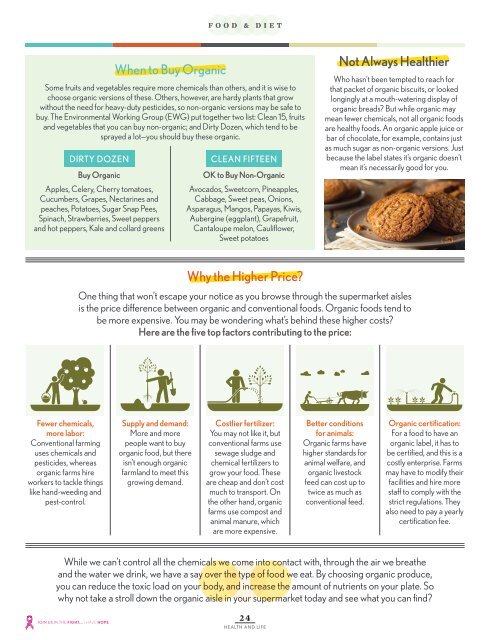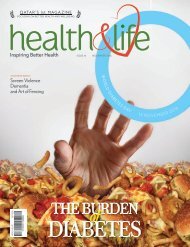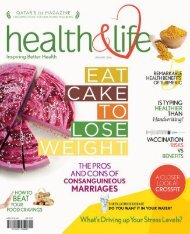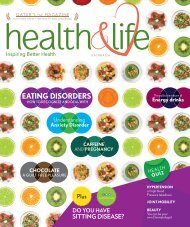Health and Life Magazine October 2016
Health and Life Magazine October 2016
Health and Life Magazine October 2016
Create successful ePaper yourself
Turn your PDF publications into a flip-book with our unique Google optimized e-Paper software.
FOOD & DIET<br />
Buy Organic<br />
Apples, Celery, Cherry tomatoes,<br />
Cucumbers, Grapes, Nectarines <strong>and</strong><br />
peaches, Potatoes, Sugar Snap Pees,<br />
Spinach, Strawberries, Sweet peppers<br />
<strong>and</strong> hot peppers, Kale <strong>and</strong> collard greens<br />
When to Buy Organic<br />
Some fruits <strong>and</strong> vegetables require more chemicals than others, <strong>and</strong> it is wise to<br />
choose organic versions of these. Others, however, are hardy plants that grow<br />
without the need for heavy-duty pesticides, so non-organic versions may be safe to<br />
buy. The Environmental Working Group (EWG) put together two list: Clean 15, fruits<br />
<strong>and</strong> vegetables that you can buy non-organic; <strong>and</strong> Dirty Dozen, which tend to be<br />
sprayed a lot—you should buy these organic.<br />
DIRTY DOZEN<br />
CLEAN FIFTEEN<br />
OK to Buy Non-Organic<br />
Avocados, Sweetcorn, Pineapples,<br />
Cabbage, Sweet peas, Onions,<br />
Asparagus, Mangos, Papayas, Kiwis,<br />
Aubergine (eggplant), Grapefruit,<br />
Cantaloupe melon, Cauliflower,<br />
Sweet potatoes<br />
Not Always <strong>Health</strong>ier<br />
Who hasn’t been tempted to reach for<br />
that packet of organic biscuits, or looked<br />
longingly at a mouth-watering display of<br />
organic breads? But while organic may<br />
mean fewer chemicals, not all organic foods<br />
are healthy foods. An organic apple juice or<br />
bar of chocolate, for example, contains just<br />
as much sugar as non-organic versions. Just<br />
because the label states it’s organic doesn’t<br />
mean it’s necessarily good for you.<br />
Why the Higher Price?<br />
One thing that won’t escape your notice as you browse through the supermarket aisles<br />
is the price difference between organic <strong>and</strong> conventional foods. Organic foods tend to<br />
be more expensive. You may be wondering what’s behind these higher costs?<br />
Here are the five top factors contributing to the price:<br />
Fewer chemicals,<br />
more labor:<br />
Conventional farming<br />
uses chemicals <strong>and</strong><br />
pesticides, whereas<br />
organic farms hire<br />
workers to tackle things<br />
like h<strong>and</strong>-weeding <strong>and</strong><br />
pest-control.<br />
Supply <strong>and</strong> dem<strong>and</strong>:<br />
More <strong>and</strong> more<br />
people want to buy<br />
organic food, but there<br />
isn’t enough organic<br />
farml<strong>and</strong> to meet this<br />
growing dem<strong>and</strong>.<br />
Costlier fertilizer:<br />
You may not like it, but<br />
conventional farms use<br />
sewage sludge <strong>and</strong><br />
chemical fertilizers to<br />
grow your food. These<br />
are cheap <strong>and</strong> don’t cost<br />
much to transport. On<br />
the other h<strong>and</strong>, organic<br />
farms use compost <strong>and</strong><br />
animal manure, which<br />
are more expensive.<br />
Better conditions<br />
for animals:<br />
Organic farms have<br />
higher st<strong>and</strong>ards for<br />
animal welfare, <strong>and</strong><br />
organic livestock<br />
feed can cost up to<br />
twice as much as<br />
conventional feed.<br />
Organic certification:<br />
For a food to have an<br />
organic label, it has to<br />
be certified, <strong>and</strong> this is a<br />
costly enterprise. Farms<br />
may have to modify their<br />
facilities <strong>and</strong> hire more<br />
staff to comply with the<br />
strict regulations. They<br />
also need to pay a yearly<br />
certification fee.<br />
While we can’t control all the chemicals we come into contact with, through the air we breathe<br />
<strong>and</strong> the water we drink, we have a say over the type of food we eat. By choosing organic produce,<br />
you can reduce the toxic load on your body, <strong>and</strong> increase the amount of nutrients on your plate. So<br />
why not take a stroll down the organic aisle in your supermarket today <strong>and</strong> see what you can find?<br />
JOIN US IN THE FIGHT... I HAVE HOPE<br />
24<br />
HEALTH AND LIFE
















